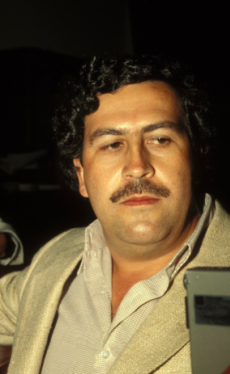
Email: lienaaltai@icloud.com
Total Article : 47
About Me:Sixth form student with an interest in a wide variety of topics such as languages, history, philosophy, politics and literature

As the new season of the popular Netflix drama Narcos launches, many viewers across the world are tuning in to find out what happens in the second season. The show is based on the true story of Pablo Escobar, a Colombian drug lord from the Medellin cartel, who was responsible for 80% of the cocaine smuggled in America during the 80s and 90s. As season one of the programme was mainly focused on the start of the Colombian cocaine industry and the rise of world renowned drug lords, season two places near-total emphasis on Escobar’s fight with DEA (Drug Enforcement Administration), an American federal law enforcement agency, and the Colombian government alongside other rivals who strive to shut Escobar and the Medellin cartel down.
For many, Pablo Escobar was a familiar name however, that was all it was - a name, alongside a few other basic details about his life as a notorious cocaine trafficker. Therefore, Narcos was not only an addictive TV series for viewers across the globe; it was also an educational tool. Viewers gained what they believe to be a solid understanding of every who, what, where, when and why there was to be asked. Given that the producers of the show had the assistance of the real-life Javier Peña and Steve Murphy, who were the two main DEA agents that participated in the hunt down for Escobar, surely this was enough to validate the legitimacy of the story being told to us through our screens?
Before the start of each episode the producers warn that despite the show being based on “true events”, there are “certain scenes… incidents… and events have been fictionalised for dramatic purposes”. However, those who were the nearest and dearest of the cocaine kingpin disagree with the term “dramatisation” of the events, branding it too mild. Instead, the son of Escobar, who goes by the new legal name of Sebastian Marroquin, referred to the programme as “an insult [to the] history of a whole nation”. Marroquin took to Facebook to list as many as 24 inaccuracies of the show.
Firstly, Marroquin states that his paternal uncle, Carlos Henao, was not at all the person his character is in the show. In the programme, Henao was a drug-dealer living in Miami however in reality, he was an architect who also sold Bibles.
When escaping from La Catedral, Escobar did not have any assistance from his contacts in escaping. In fact, he was able to escape as he ordered loose bricks in his prison cell and escaped when he was denied the opportunity to switch jails by the Colombian government.
The Medellin and Cali cartel had no agreement to stick to certain states. As the show shows that the Medellin cartel fuelled Miami whereas the Cali supplied New York, Marroquin states that there was no such deal as there were enough clients for both cartels to operate in both cities.
The programme shows Escobars’ mother accusing his wife of betraying him whereas the truth was that it was Escobars' mother who betrayed him, as did his older brother.
Despite these inaccuracies, Narcos has been renewed for at least two more seasons which shows that even though Escobar was journey is over, the Medellin cartel wasn’t.
http://www.vox.com/2015/10/21/9571295/narcos-pablo-escobar-colombia

0 Comment:
Be the first one to comment on this article.